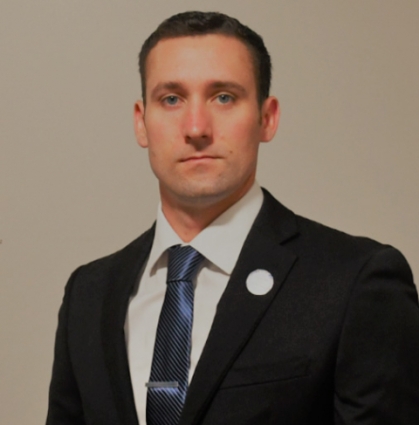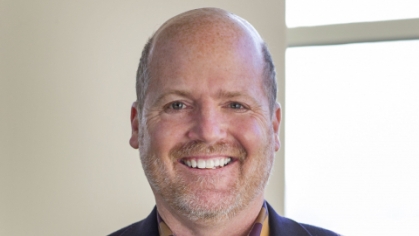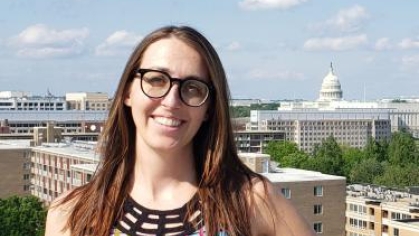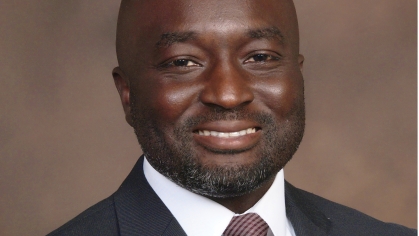Alumni Spotlight: Kenneth Faria ENG'19

“It takes grit to get through an engineering degree. But now that I’m doing legitimate chemical engineering, I’m really seeing the fruits of my labor pay off.” –Kenneth Faria
Chemical engineering major Ken Faria is a drug substance technology process engineer at Bristol-Meyers Squibb, where he began working as an intern in 2017. While he entered Rutgers after active duty service in the U.S. Air Force, he is currently a Staff Sergeant Airman with the Air National Guard. At Rutgers, he was the president and founder of the University’s chapter of STEM Veterans USA, which connects veterans pursuing STEM studies with networking, internship, and employment opportunities. In 2018, his commitment to leadership and campus and community involvement was recognized with a Rutgers Bridge Builder Award.
What was your role in the Air Force?
I’m not a pilot, but I have about a decade’s worth of experience. My current role is to coordinate air support for front-line forces. We’re the guys on the ground with radios, making sure bombs don’t fall on civilians, but strike their targets. I’ll be heading to officer training school – the same thing that ROTC cadets go through during their sophomore or junior summers to become officers.
You’re from Livermore, California. Why did you choose Rutgers?
I stayed in contact with active duty friends from my Air Force training. One of them was from southern California and he went to Rutgers after he was stationed out. He let me know that Rutgers was ranked as the nation’s number #3 school for military vets.
What sets Rutgers apart as a school for veterans?
Rutgers gets high accolades for helping military veterans transition to being students. Rutgers hits the nail on the head for its veteran students in every category – from retention rates to ease of transition and support programs to getting employed. Rutgers helps you complete school and be successful.
What drew you to chemical engineering?
The military set me up to be successful. A silly Google link pushed me over the edge. I looked up the hardest engineering degree – chemical engineering -- and I chose that one. Coming from military, I had to do the hardest thing in school. I loved it and love doing it now.
What was it like to be a first generation student?
As a first generation student, I leaned on Rutgers Veterans House a lot to help me transition. My fellow vets helped me learn how to study. In high school, I wasn’t interested in school per se. I was good at what I wanted to do, which was playing drums. Once I got to Rutgers, I didn’t have that family establishment above me to help with academics. But the military in general is a highly educated population – so I had them to lean on at Rutgers.
You founded the STEM Veterans USA chapter at Rutgers. What services are you most proud of that the chapter has offered Rutgers’ STEM vets?
I’m proud of two big things – supporting military students’ professional development and building bridges to connect with organizations outside of the University.
The Bridge Builder Award was presented to me, but it really was for work our chapter did with external partners such as Vets for Warriors, a non-profit health organization that runs an emergency hotline service out of Rutgers’ behavioral health area that lets vets talk to other veterans, which can be a very important thing.
Rutgers Gardens also adopted a trail as part of a multi-phase plan to establish a “global war on terrorism” memorial that would be a tranquil, outdoor place for my fellow veterans – and non-vets – to go to. This is one of the last projects I worked on – a bench is being installed on the trail.
Your Bristol-Myers Squibb internship started in summer 2017, when you were a sophomore. What came next?
It was initially a hybrid internship in the summer. I spent half my time supporting their veterans group and the other half supporting their research group. I continued to work as an intern up until my senior year, when my manager wanted to bring me on full-time as a contractor during the school year.
Now that I’ve graduated, I’m a full-time process engineer, supporting the manufacture of active pharmaceutical ingredients for clinical trials that we hope to eventually bring to market – and help people.
Bristol-Meyers Squibb is a military friendly company, so I’m still actively involved with its Veterans Community Network, which supports veterans’ programs for more than 1,000 national members.
You presented the Rutgers School of Engineering 2018 Distinguished Alumnus in Research Award to Christopher Sinko, senior vice president and head of product development at Bristol-Meyers Squibb. Has he influenced your approach to leadership?
I was lucky enough as an intern to hear him speak with me and a group of interns about leadership. One thing he mentioned as a leader has stuck with me ever since. He said he’d learned to assume good intent from his subordinates and generally in life. I’ve tried to follow this advice to enhance my leadership and personal skills.
What do you most value in terms of your Rutgers education?
Everything. It takes grit to get through an engineering degree. Now that I’m doing legitimate chemical engineering, I’m really seeing the fruits of my labor pay off.
I also value the camaraderie I developed with my fellow engineers. There’s something special when you meet another engineer and understand what you’ve both gone through. There’s an immediate level of understanding and respect.
It was awesome to be in an academic setting with students with similar and dissimilar mindsets. We all approach problems differently – but contribute equally to solving problems.
Did any professors influence or inspire you?
Professor Alex Bertuccio was awesome, especially during my senior year. He understood my special situation as an unconventional student who was also in the Air National guard and working at Bristol-Meyers Squibb.
Professor and department chair Helen Buettner was very supportive ever since Chemical Engineering Analysis 1 class.
Has your military service helped you?
I’d been going to go the blue-collar route out of high school, but instead went into the Air Force. There were a lot of amazing people to look up to in the military. I attribute my ability to work long hours to complete multiple tasks simultaneously to my military service. I look at things differently – I know the military set me up to be successful.
What did you do for fun as a student?
I didn’t have much free time, to be honest. I like to exercise and enjoy long-distance running. Math’s a basis for success in STEM programs, so I wanted good understanding of math principles and would spend time solving math problems.
Last November, I took part in a marathon to benefit the Green Beret Foundation. During the month, I trained for a 26.2-mile marathon by carrying a heavy, 50-pound pack for 100 miles cumulatively. It was absolutely miserable – but was for a good cause.
What was the last book you read?
I really enjoy listening to scientifically charged podcasts, to keep my skills up to date. I mix my reading up quite a bit with history reading that will supplement my military career and more technical stuff related to my work.
What was the last movie you saw?
I recently binge-watched the documentary mini-series One Strange Rock. Will Smith narrates and eight astronauts offer unique perspectives of planet Earth. There’s a drastic range in what I enjoy -- I also liked The Big Lebowski.
You mentioned you played drums as a teenager. What kind of music do you like?
I like a range. At my workstation, I listen to classical music and electronic dance or house music. But on the weekend, it’s classic rock and groups like the Black Keys.
If you were to go on vacation tomorrow, where would you go and why?
I’m so far away from home and family in California that my vacations are pretty much going home. I’ve never really been on a real vacation. I was in the military and worked and then went to school and worked. My girlfriend keeps telling me about her trip to an all-inclusive resort in Mexico. I’d like to do something like that.


